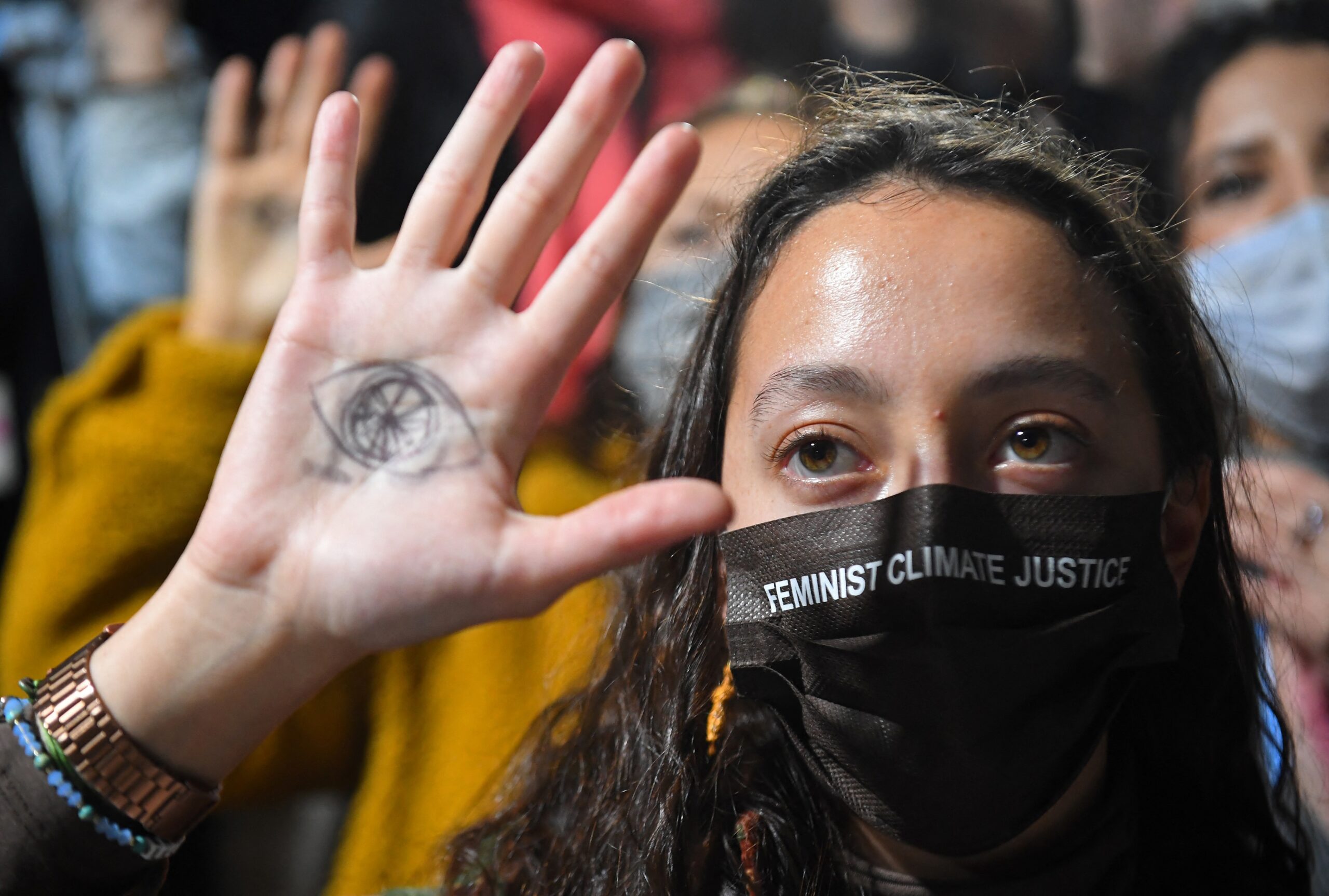Woo Qiyun is obviously a true-blue Singaporean: she frequently complains about the country’s incessant heat and humidity. A climate communicator and self-taught illustrator, Woo takes to social media to candidly explain the scientific causes of the island’s extreme weather through her illustrated infographics.
Through these posts, Woo highlights the urgency of the climate crisis to nearly 12,000 followers. She’s not alone in her fight. Her voice is one of a growing number of young Singaporean climate activists who are using their platforms to urge leaders to do more to mitigate climate change.
At the 26th United Nations Climate Change Conference (COP26) in November in Glasgow, Scotland, Singapore struck a decidedly optimistic and ambitious note, with minister for sustainability and the environment Grace Fu insisting Singapore “does not shy away from taking bold action where we can” to address the climate emergency.
Yet as recently as September, Singapore was rated “Critically Insufficient” by Climate Action Tracker in its efforts to meet the 2015 Paris Agreement requirements to limit warming to 1.5 degrees Celsius (2.7 degrees Fahrenheit) above pre-industrial levels. The temperature is considered the climate tipping point, above which the world is certain to experience future ecological calamity and related human suffering.
The Singapore government has claimed the tracker does not account for the country’s “unique challenges” including high population density and limited access to alternative energy sources. But the country’s young climate activists are tired of what they consider a slow pace of progress and want to express their feelings loud and clear.
“I don’t doubt that there are a lot of constraints and challenges and difficulties [to meet the Paris Agreement],” Woo said. “But there’s also in my mind a niggling feeling of: When are we going to really, no pun intended, step on the gas pedal?”
The 24-year-old was a co-author of a climate pledge titled, “An Urgent Call From Singapoorean Youths On The Environmental Crisis.” Published by activists from a broad coalition of climate-focused and indigenous youth groups in Singapore, the pledge makes urgent recommendations for change, including peaking emissions before 2025, a mere three years from now.
“We [published the pledge] on the Youth Day of COP, because we felt that, as youths, we want a seat at the table. And I think, at least I speak for myself, we haven’t really gotten that seat,” Woo said.

Tammy Gan is another activist demanding more action from the government. She noted the appearance at COP26 of Singapore, a rich nation in a region of less prosperous neighbours, was “a complete abdication of responsibility.”
Graduating with an environmental studies degree from Yale-NUS College in the summer of 2021, the 23-year-old runs the Instagram account @tammy__online, where she posts infographic explainers on climate justice and decolonisation. She is also head of content and storytelling at Advaya, an educational platform about ecology and spirituality, and production manager for the Green Dreamer podcast.
For Gan, COP26 was effectively a promotion for the fossil fuel industry, which many activists have pointed out has used the summit as a means of greenwashing. The industry had the largest delegation at the summit, more than any participating country.
In contrast, “youth activists, indigenous activists, and local people who actually face the brunt of the crisis, weren’t even allowed [into the same meetings],” Gan noted.

Singapore is in the same thrall to the fossil fuel industry, she said, citing the nation’s endorsement of a “green growth” path of economically sustainable development that critics have derided as impossible without structural change.
“I think we definitely prop up a lot of this business-as-usual rhetoric, while at the same time claiming that we’re doing a lot for the climate,” Gan said. “You can’t do both of those things at once.”
Singapore published a Green Plan in March purporting to turn the country “into a greener and more sustainable city by 2030.” But academics such as Vinod Thomas, visiting professor at the Lee Kwan Yew School of Public Policy (LKYSPP), described the plan’s targets as “extremely weak.”
“With 95% of energy coming from a fossil fuel – natural gas – the Republic lags enormously in climate mitigation, in other words, actions to slow climate change. The mitigation plans as they stand are paltry,” Thomas told LKYSPP publication Global-is-Asian.
If fully implemented, Singapore’s policies would exceed its emissions reduction targets, but only in line with warming of 3 degrees Celsius (5.4 degrees Fahrenheit), which is twice the Paris Agreement level, Climate Action Tracker noted.
With such urgent goals, youth activists navigate a tightrope of being highly vocal and politically delicate. Singaporean activists must tread carefully while campaigning in a nation where political activism of any kind is strictly controlled.
Prior to the Covid-19 pandemic, permits had to be obtained to stage rallies at the Speaker’s Corner in Hong Lim Park, the country’s sole designated area for public demonstrations. Applications to hold events have been suspended since the introduction of social distancing measures in January 2020 and no alternatives have been provided.
Whereas Swedish teenager Greta Thunberg was thrust into the global spotlight for holding a placard outside her country’s parliament, youth climate activists Wong J-min and Nguyen Nhat Minh faced police questioning when they held up signs supporting climate change movements in Singapore in March 2020.
Even though her life is not actively threatened, Gan worries about the unspoken risks of campaigning in Singapore.
My relationship with activism in Singapore has really shifted over time in part because of fear of crackdown and civil liberties
Tammy Gan, environmental activist
“I definitely think it’s really frustrating,” she said. “My relationship with activism in Singapore has really shifted over time in part because of fear of crackdown and civil liberties.”
Recent laws like the Foreign Interference (Countermeasures) Act 2021, or FICA, have inhibited Gan’s climate work. The law grants the home affairs minister the power to remove or criminalise online content suspected of taking place on behalf of foreign actors. Gan’s work involves communication with many foreign NGOs, which compels her to post messages and information online with a certain degree of self-censorship to avoid the wrath of FICA.
“There is a lot of risk in climate work even though it’s not explicitly anti-government, and it’s still unsafe,” Gan said. “I can’t say everything that I want to say.”
Instead of urging the kind of direct action seen in other countries, activists like Gan have channeled their labour into education.
“Through Instagram or otherwise, education has a lot of potential because it is not necessarily seen as activism, Gan said. “It’s not seen as protest [nor] making statements. But it can be very culture shifting and attitude shifting, and I think that’s really what needs to happen in Singapore.”
Gan said she believes climate justice in a Singaporean context involves society considering its own privileges.
“I think the way towards climate justice,” Gan said, “really needs to involve getting people to think about: How are we connected to the world? How are we privileged people in this world? How are we consuming much more than we need?”
“All these are questions that can be solved, addressed, and changed through education,” she said.
Woo, who runs @theweirdandwild, similarly said she believes in the power of knowledge sharing, especially involving tools to engage with Singapore’s political system and elected representatives. Her Instagram account is filled with explainers of the Singapore parliament’s structure and table motions to help followers track climate and climate-related bills.
After the first climate change motion was tabled in the Singapore parliament in February, Woo shared self-illustrated infographics detailing the amendments to the original motion and the potential effects of its passage. She also identified members of parliament (MPs) who voted for the bill and urged their constituents to write to them.
“So many activists around the world are very engaged with their local politicians,” she noted.
Woo attempts to bring writing to elected representatives into the mainstream, “especially when it comes to touchy or sensitive issues, or very urgent issues,” she said.
Woo also regularly posts environmental impact studies concerning the few forested spaces left in Singapore and publicises government redevelopment plans, urging her followers to submit their thoughts.
Civic engagement in Singapore recently has increased, especially on the issue of the decreasing number of green and blue spaces on the island. The Housing and Development Board’s open consultation on Dover Forest at the start of 2021 was extended multiple times due to continued public interest and received over 1,800 responses.
The unique challenges presented by the ongoing Covid-19 pandemic has meant most civic engagement, already mostly online, has stayed online indefinitely. Woo felt this shift after previously hosting in-person events to reach people who were inaccessible through online engagement.
“Because I started this [Instagram account] in 2019, momentum only started to pick up in the midst of COVID, which really hampered a lot of activities that could have aligned with the environment and sustainability,” she said.
But the pandemic has proven to be a blessing for other activists like Kate Yeo, who runs the Instagram account @byobottlesg. The 20-year-old got involved in climate and environmental activism in 2018 by launching Bring Your Own Bottle, a campaign and social enterprise that partners with retailers in Singapore to offer discounts and perks to customers who bring their own containers to stores.
The pandemic led many young people worldwide to organise digital strikes, such as those in which Yeo participated. Through these strikes, the first-year undergraduate met other activists and co-founded the Re-Earth Initiative, a campaign to increase climate movement accessibility through online education and writing tools.
Despite the constraints on climate activists in Singapore, imposed or self-imposed, they still see social media’s potential to reach a wider audience.
“Through social media, we reached out to 300,000 people across the world, and that was my first time really organising online and mobilising the masses. From there, my platform kind of just took off,” Yeo said.
Social media is also an accessible means for activists to share narratives and from there, they hope, change lives.
“I really believe the power of storytelling goes a really long way,” Gan said. “I do think that there’s power in people using social media platforms in a different way that inspires our communities to think about things differently and to live differently.”


